Click to Get 2 FREE Boxes/Cans
Click to Get 2 FREE Boxes/Cans
Only New Customers! Click HERE to Get 2 Extra Boxes/Cans for Free With Your First Order.
Only New Customers! Click HERE to Get 2 Extra Boxes/Cans for Free With Your First Order.
BABY FORMULA
Offering new parents top-quality European infant formula from renowned brands like HiPP, Holle, Kendamil, and more. If you’re uncertain about which product to choose, our Formula Finder can help you make the best decision for your baby.
Baby Food
Offering new parents a premium selection of European baby foods, including jars, pouches, cereals, and snacks from esteemed brands like HiPP and Holle.
Goat vs. Cow Milk Formula: A Detailed Guide of Differences
by Agustina Fernandez May 01, 2024 11 min read
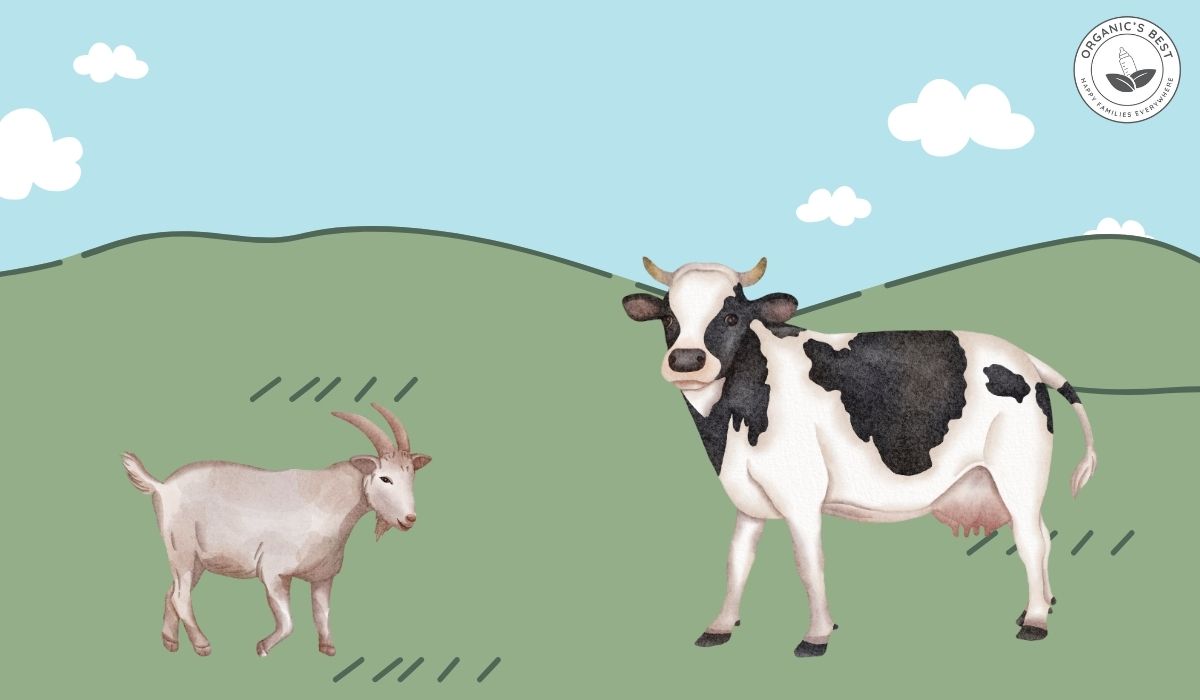
Finding the best nutrition for little ones is every parent's top priority. So, if you're debating between formula types and can't quite make up your mind, don't worry: you're not alone.
The most common types of baby formula on the market today are cow and goat milk infant formula. Each has lots to offer, with strengths in certain areas and, of course, disadvantages too.
Today, we'll examine what makes cow milk—and goat milk-based infant formulas worth your attention. By comparing their nutritional composition, benefits, and drawbacks, we'll help you find the best option to ensure your baby's health and happiness!
Table of Contents
- Goat vs. Cow's Milk: The Nutritional Showdown
- Disadvantages of Goat Milk Formula for Babies
- Goat Milk-Based Formula: Our Top 4 Picks
- Advantages of Cow Milk-Based Formula
- 3 Must-Know Cow's Milk Brands for Your Baby
- Answering Your Burning Questions About Goat's Milk Formulas
- Milk Matters: Making the Wisest Choice for Your Baby's Nutrition
Goat vs. Cow's Milk: The Nutritional Showdown
In your hunt for the best formula, you've likely stumbled across blog articles, videos, and reviews where parents proclaim that goat milk-based formulas are best while other parents swear that cow's milk formula is better.
Ultimately, no one type of formula is better than another because different babies will respond to them differently. The main reason why goat—and cow-milk infant formulas may affect your baby differently lies in the minor nuances of their composition.
But before we discuss the details of goat milk vs. cow milk formula, it's important to remember that all baby formula must meet the same strict nutritional standards.
This means that each milk-based infant formula offers similar micronutrients, like vitamins and minerals, and macronutrients, like calories or fats. Ultimately, the composition of any raw milk has to be adjusted to satisfy infant nutrition regulations.
That being said, some differences between cow and goat milk remain, which can make one of these formulas better suited for certain babies. We'll discuss the differences between cow and goat milk formula in depth now!
1) Goat Milk Naturally Has More Medium-chain Fatty Acids
Compared to cow's milk, goat milk-based formula contains more medium-chain fatty acids. These are a special type of fat that is an important source of energy for babies.
Unlike the long-chain fatty acids more prevalent in cow milk formula, the medium-chain fatty acids in goat milk are easier for our bodies to absorb and digest. That's why goat milk formulas are considered gentler on tiny tummies and well tolerated by sensitive babies.
2) Goat Milk Protein is A2
There are two main proteins that comprise milk: A1 and A2. Most cow's milk today is naturally A1, whereas goat milk, on the other hand, is A2. A2 proteins are considered less allergenic and easier to digest compared to cow milk infant formulas. Plus, human milk, like goat's milk, is also A2!
What makes A2 proteins more digestible is that A2 milk forms smaller and softer milk curds in the stomach that pass through the digestive system with more ease. Cow's milk, while considered safe for most babies, tends to create heavier, firmer curds that some babies struggle to digest.
This means that goat milk infant formula offers a milder alternative for babies with sensitive tummies. However, goat milk is still unsuitable for babies with cow's milk protein allergy as there are enough similarities between goat's and cow's milk that even goat milk-based formula can trigger an allergic reaction.
3) Goat Milk Has Less Lactose
Lactose, or milk sugar, is the primary carbohydrate in breast milk that supplies babies with energy for growth and development. Some goat milk formula, depending on the recipe, may have less lactose than cow's milk formula. This is because raw goat milk has naturally lower lactose levels.
For certain babies who are sensitive to lactose, goat milk formula may be easier to digest. However, lactose is often considered the gold standard for carbohydrates and is well tolerated by most babies. Thus, a reduced-lactose formula is not a one-size-fits-all solution to tummy troubles.
Moreover, goat milk formula is still not suitable for little ones with lactose intolerance as it contains enough lactose to cause digestive problems.
4) Goat Milk is Rich in Certain Minerals
Both cow—and goat-milk-based formulas have a rich nutritional profile designed to satisfy and nourish infants. However, it's worth noting that plain cow's milk naturally contains more carbohydrates, while plain goat milk has higher levels of calcium and potassium, among other minerals.
While both goat and cow milk infant formulas contain all the essential nutrients needed to achieve nutritional adequacy, some parents may prefer formulas that are naturally higher in certain nutrients, as this means less processing is required to ensure that the milk is nutritionally complete for infants fed formula.
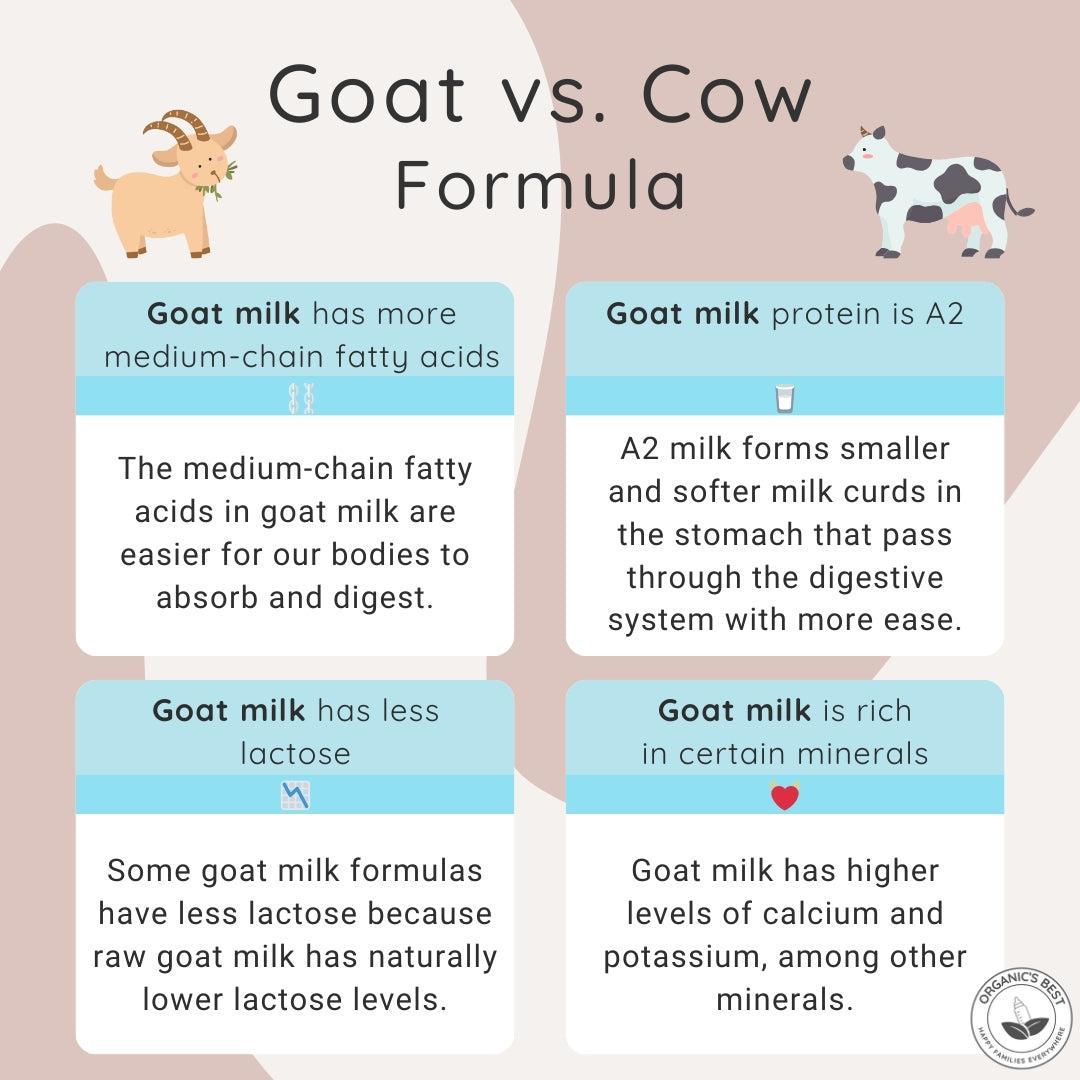
Disadvantages of Goat Milk Formula for Babies
Now that we've covered what's to love about goat's milk, it's time to balance things out with a look at its disadvantages.
First, goat milk formula is a relatively new option in the formula market, so some parents might feel a bit skeptical about it. Nonetheless, this type of formula has a lot of goodness to offer and has been deemed a safe and nutritious choice for babies by both the Food and Drug Administration (FDA) and the European Food Safety Authority (EFSA).
The most recognizable downside of goat milk is its taste. Goat milk has a stronger flavor than cow's milk, so naturally, that means goat milk formulas taste different, too. They are often described as fresher, with a creamier texture and a slightly gamier taste. While these formulas still taste yummy to many, not all babies enjoy this flavor profile, especially if they are used to only drinking cow's milk.
When Goat's Milk Should be Avoided
No product is perfect, and goat milk formulas aren't an exception. Despite all of its amazing qualities, goat's milk formula is still not a solution for cow's milk protein allergy or lactose intolerance.
If you suspect your baby isn't tolerating goat's milk formula, here are the signs you should look out for:
• Gas
• Bloating
• Diarrhea
• Excessive fussiness
• Colic
• Change in appetite
• Firm belly
• Allergic reaction (rashes, hives, or eczema)
If you notice these symptoms in your baby, please reach out to a healthcare professional.
Remember, before selecting a formula for your baby, it's crucial to discuss your options with your baby's pediatrician. They can expertly assess your baby's needs and recommend the best formula to keep both your little one and you happy.
Goat Milk Formula is a Perfect Match for Your Baby If:
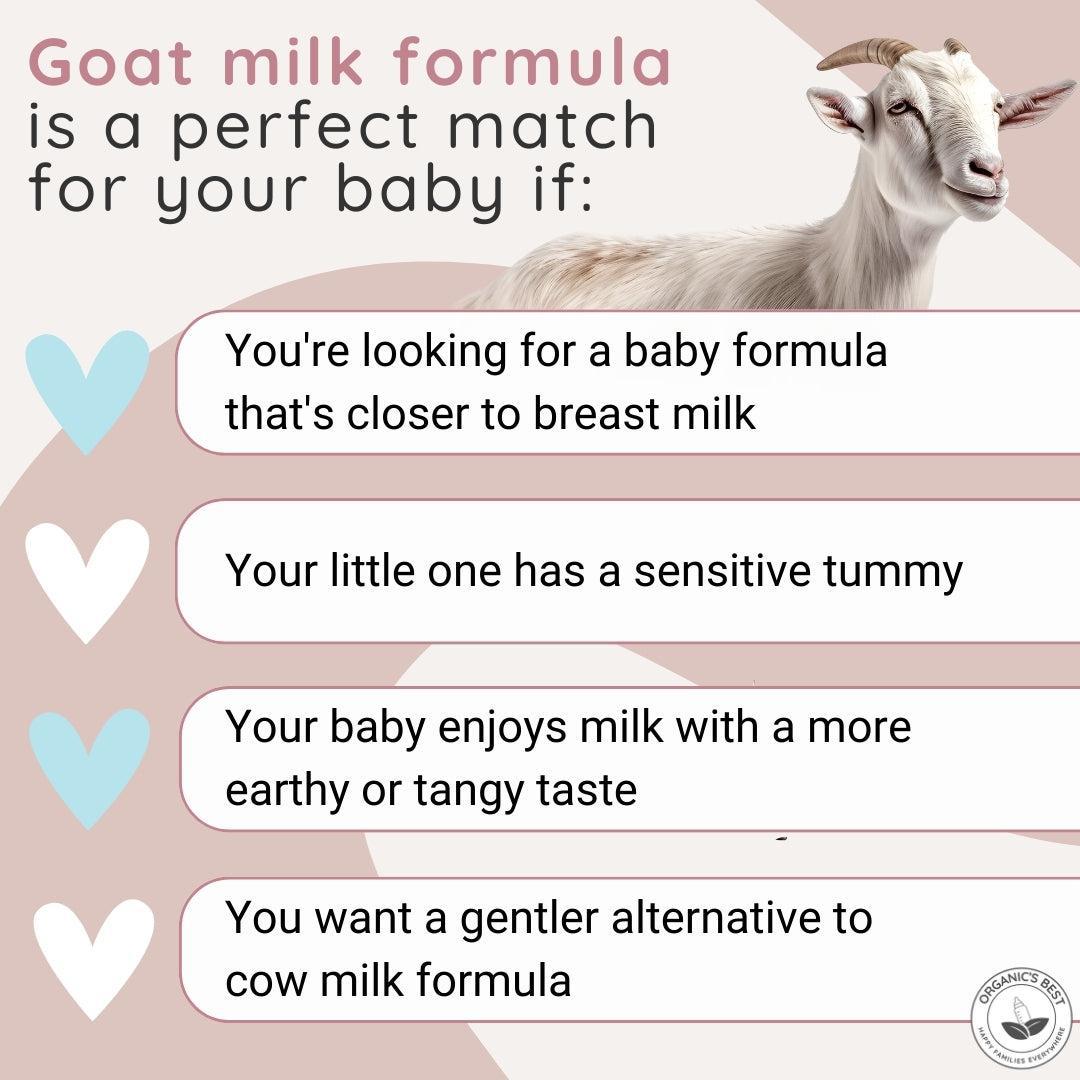
To refresh your baby about the advantages of goat milk infant formulas, here is a quick summary of situations in which this type of formula is well suited for babies.
-
You're looking for a baby formula that's closer to breast milk
-
Your little one has a sensitive tummy
-
Your baby enjoys milk with a more earthy or tangy taste
-
You want a gentler alternative to cow milk formula
Goat Milk-Based Formula: Our Top 4 Picks
The brands discussed below offer popular European formulas based on goat's milk. Keep reading to discover the product highlights of each formula.
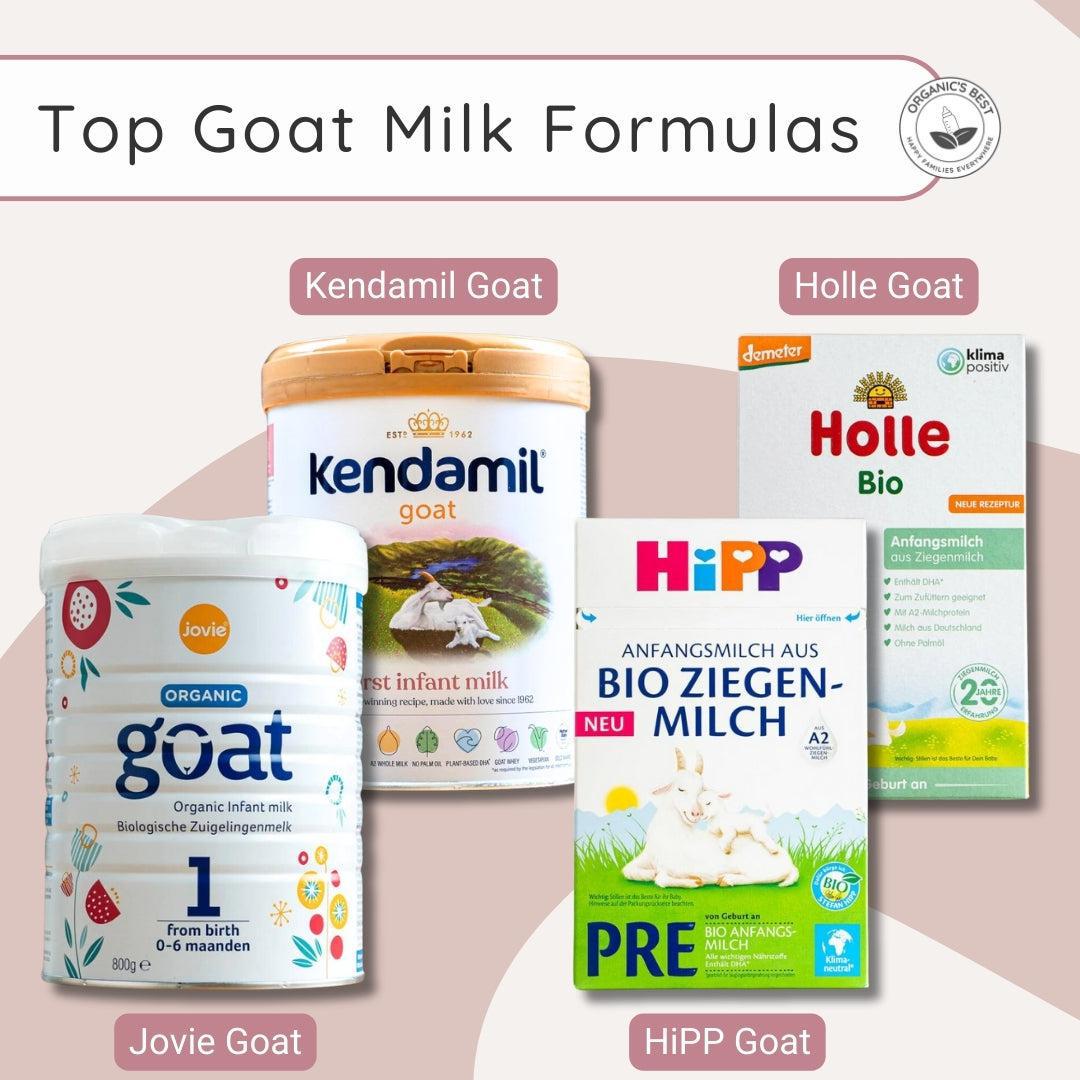
#1 Holle Goat
Holle is a German company that lovingly crafts organic European infant formula using top-quality whole goat milk sourced from Demeter farms. Demeter holds the strictest global organic standards for a clean baby formula you can trust.
Their organic goat milk infant formula has a fairly short ingredient list compared to many other brands and includes only essential nutrients for your baby's growth and development. Holle's minimally processed goat milk-based formula offers gentle nutrition and is great for little ones who experience mild digestive problems. Holle goat milk formula is offered in German and Dutch versions.
#2 Kendamil Goat
Kendamil is another popular brand with a well-deserved reputation. They produce the only full-cream goat milk formula made in the United Kingdom, showcasing their commitment to using responsibly sourced local ingredients. Unlike the rest of the goat's milk-based infant formula on our list, Kendamil produces regular goat milk formula that is not certified organic. However, this premium-quality milk is still GMO-free.
Kendamil goat offers a smooth, creamy texture that babies love. Parents also appreciate that this milk is 100% lactose-based at every stage. That means you won't find any starch or maltodextrin in their formulas. Kendamil also excludes palm oil, fish oil, and soy and is a certified vegetarian goat's milk-based formula!
#3 Jovie Goat
Jovie goat milk formula features premium ingredients that undergo minimal processing to preserve the natural benefits of full-fat goat milk. In addition to being European organic, Jovie is also certified glyphosate residue-free, which means their formulas are verified not to contain one of the world's most popular herbicides— glyphosate.
Another standout feature of Jovie is that this brand chooses nutrients that are absorbed more efficiently by the body, including chelated iron and zinc, plus 5-MTHF as a better folate source. All in all, Jovie is well-loved among health-conscious parents looking for the cleanest infant formula for their babies.
#4 HiPP Goat
Another good alternative to cow milk infant formula is HiPP Goat. HiPP is a family-run German company that specializes in crafting innovative baby formulas based on the latest scientific advances. Its goal is to offer babies formula that is as close as possible to breast milk.
One of the main perks of HiPP Goat is the added prebiotics from lactose. Prebiotics are non-digestible fibers that provide energy to beneficial gut bacteria and help support smooth digestion in babies. Prebiotics also naturally occur in breast milk, which helps bring HiPP Goat one step closer to nature's example.
Advantages of Cow Milk-Based Formula
Akin to goat formula, cow milk-based infant formulas offer a balanced combination of fats, cow milk proteins, carbohydrates, and essential vitamins and minerals to support your baby's growth and development.
A point of difference is that cow milk formulas have existed for a long time and are typically recommended as the first choice of formula for healthy babies.
Another benefit to consider is that many babies easily accept the taste of cow milk-based formulas. Cow's milk offers a creamy, smooth texture without the tangy, earthy flavor of some goat milk-based formulas. So, for picky babies, cow's milk formulas may be a better choice.
Finally, cow's milk baby formula tends to be slightly cheaper than goat's milk options. However, here at Organic's Best, we offer discounted pricing on bulk formula orders, which helps make goat's milk formula more affordable for families.
Cow's Milk Formula is a Perfect Match for Your Baby If:
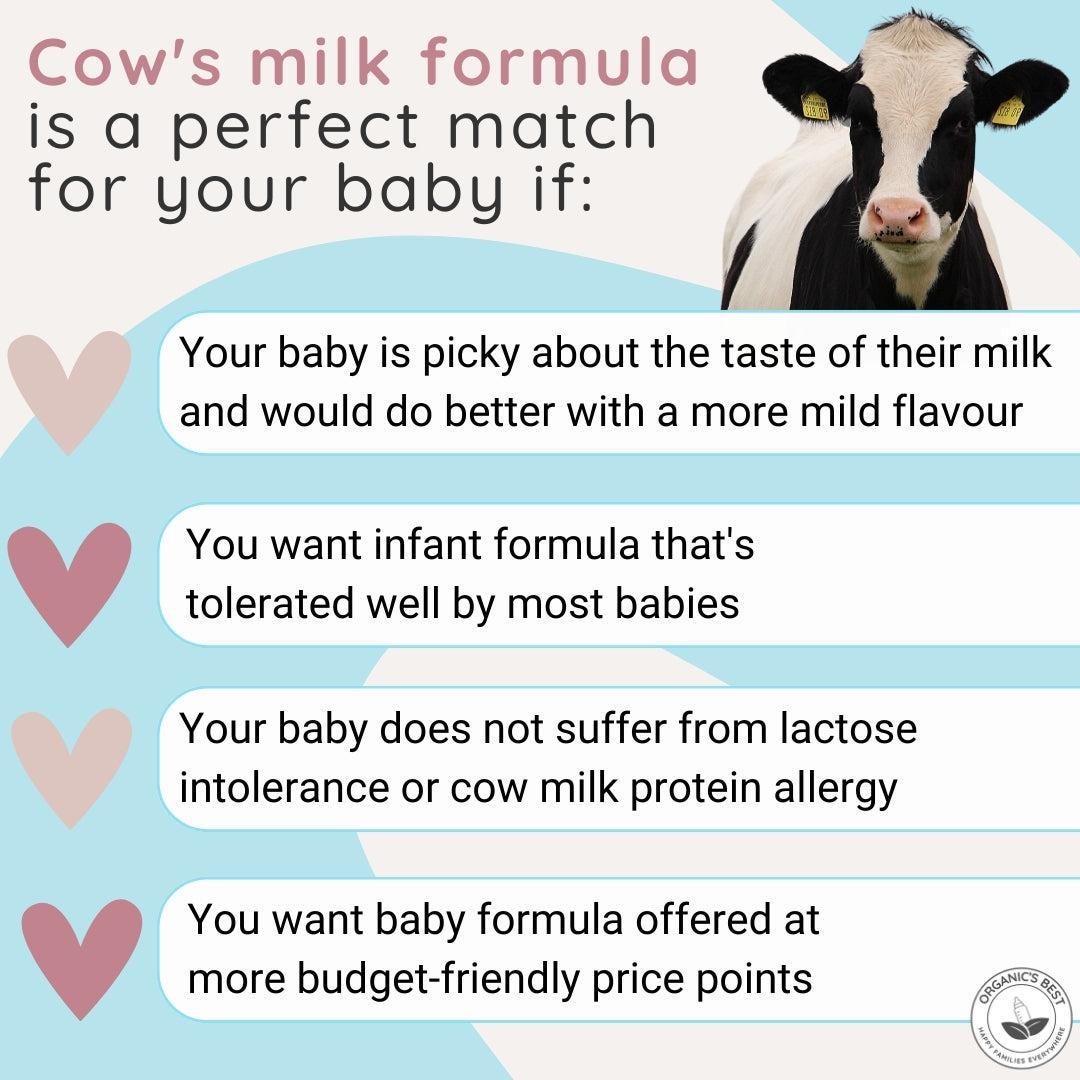
So far, we've covered a whole lot of information about cow milk and goat milk. Here's a quick summary of when cow milk formulas are a good choice to help refresh your memory.
-
Your baby is picky about the taste of their milk and would do better with a more mild flavor
-
You want infant formula that's tolerated well by most babies
-
Your baby does not suffer from lactose intolerance or cow milk protein allergy
-
You want baby formula offered at more budget-friendly price points
If all that sounds good to you and you'd like some guidance about what brands are popular for cow's milk, here is the list of our favourites!
3 Must-Know Cow's Milk Brands for Your Baby
The infant formula manufacturers below offer premium quality cow's milk-based infant formula. We discuss the key features of each product to help you differentiate between your options.
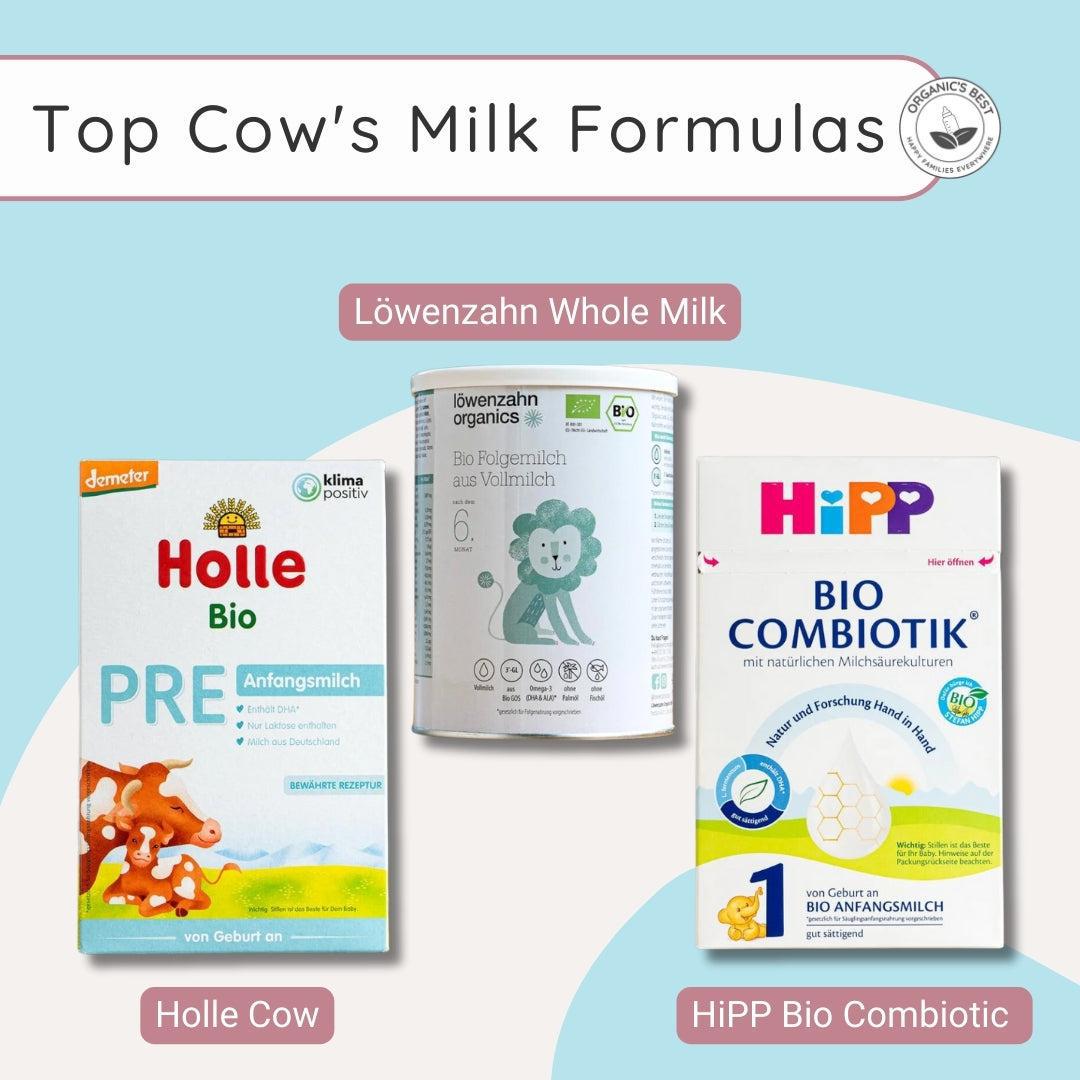
#1 Holle Cow
Holle Cow milk is one of our bestselling European infant formulas. Holle's minimally processed recipes with clean ingredients are easily accepted by babies. What separates them from other brands is that in addition to being certified European organic, Stages PRE to 3 are also Demeter certified. They offer formulas designed for the Dutch and German markets.
#2 HiPP Bio Combiotic
HiPPs Bio Combiotic formulas are made with skimmed cow's milk and enriched with prebiotics from lactose and probiotics originally extracted from human milk to help support digestion and immunity. Their formulas come in different country versions, such as HiPP German and HiPP Dutch.
#3 Löwenzahn Organics Whole Milk
While most brands rely on skimmed cow's milk-based formula, Löwenzahn Organics offers a unique range based on whole cow milk. Whole cow milk retains its natural fats and has high levels of palmitic acid. This eliminates the need for adding palm oil and helps reduce the number of vegetable oils added during processing. Löwenzahn cow's milk infant formula is also famous for its creamy texture.
Answering Your Burning Questions About Goat's Formulas
For quick answers to commonly asked questions, you can check out our FAQs for goat milk formula below!
Is Goat's Milk Really Lactose-Free?
This is a common misconception, but goat milk is certainly not lactose-free. It contains lactose, although the amounts are lower than in cow milk. For this reason, babies who are lactose intolerant cannot have goat milk formula.
Is Goat Milk Truly Superior to Cow Milk?
Each milk type has its benefits and drawbacks, so it's misleading to say that any milk is superior to another. The best formula will vary from baby to baby. That being said, goat milk baby formula offers many benefits, such as being easier to digest and closer to human breast milk.
Is Goat Milk Formula Better for Gassy Babies?
Because goat milk fats are easier to digest and the proteins are less allergenic, goat milk-based formula can be a good option for gassy babies and those with digestive issues. Please consult your pediatrician before trying goat milk formula.
Is Goat Milk Formula the Same as Hypoallergenic Formula?
No, goat milk formula is not hypoallergenic. Goat milk contains proteins that are similar to cow's milk, which means it can still cause an allergic reaction in babies with cow milk protein allergies. While it can be a great solution for infants with mild sensitivities to cow's milk, it is not safe for babies with allergies.
Can Switch from Goat Formula to Cow Formula?
If your baby is used to goat infant formula feeding, it may take your little one some time to adjust to cow milk-based formula. It's encouraged to speak with your pediatrician when making changes to your baby's diet.
How to Transition from Cow Milk Formula to Goat Milk Formula?
The best way to switch to goat milk formula is by introducing it gradually. You can start with one bottle of goat milk formula as your baby's first-morning feed. After about 5 days, you can add another bottle of goat milk formula to your feeding routine.
Gradually increase the number of goat milk bottles, and eventually, you will switch from cow's milk completely. Always speak with your pediatrician for guidance when switching formulas.
Milk Matters: Making the Wisest Choice for Your Baby's Nutrition
When it comes to goat milk vs. cow milk formula, you can be sure your baby will get everything they need to grow up healthy and strong no matter which milk you choose. Cow milk and goat milk formula brands are required to produce products that are nutritionally complete for babies.
That said, infants receiving goat milk formulas often have fewer digestive issues. So, if your little one has a sensitive tummy, goat milk might be the best choice. But before you make any decisions, make sure to consult your child's pediatrician. Together, as a team, you can find the perfect match for your baby.
|
Disclaimer: Please be aware that this information is based on general trends in babies, and it is not medical advice. Your doctor should be your first source of information and advice when considering any changes to your child’s formula and when choosing your child’s formula. Always consult your pediatrician before making any decisions about your child’s diet or if you notice any changes in your child. Breastfeeding is the best nutrition for your baby because breast milk provides your child with all the essential nutrients they need for growth and development. Please consult your pediatrician if your child requires supplemental feeding. |
Agustina Fernandez
Dr. Agustina Fernandez earned her medical degree from the prestigious Universidad Nacional de Córdoba, Argentina. With a deep-rooted passion for pediatrics, Dr. Fernandez is currently on the path to specializing in children's healthcare. Recently, she has delved into the vital field of infant nutrition. Her research interests include breastfeeding, infant formula, and baby food in little ones’ formative years. Dr. Fernandez's commitment to this area of study underscores her dedication to ensuring the health and well-being of children from their earliest days.
1 Response
Leave a comment
Comments will be approved before showing up.
Also in Organic Infant Nutrition and Health Blog

10 Winter Activities for Kids and Toddlers
by Agustina Fernandez January 06, 2026 8 min read
Read More
How to Choose The Best Infant Formula: A Guide to EU Organic Formulas
by Agustina Fernandez January 05, 2026 14 min read
Read More
Best Formula for Breastfed Babies 2026 Guide
by Agustina Fernandez January 05, 2026 15 min read
Read More
Reviewed by Dr. Bardha Citaku, MD
-

Dr. Bardha Citaku: Medical Reviewer of Organic's Best Blog
Dr. Bardha Citaku completed her medical studies at the University of Prishtina in Kosovo, where she began her journey into the field of medicine. She has since developed a career in medical research, contributing to projects with notable organizations, including the World Health Organization (WHO).

Aphra
October 23, 2022
Your blog is very useful for us to thank you so much, it is very important for knowing information about milk. aphra.in